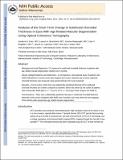Analysis of Short-Term Change in Subfoveal Choroidal Thickness in Eyes With Age-Related Macular Degeneration Using Optical Coherence Tomography
Author(s)
Fein, Jordana G.; Branchini, Lauren A.; Manjunath, Varsha; Regatieri, Caio V.; Fujimoto, James G.; Duker, Jay S.; ... Show more Show less
DownloadFujimoto_Analysis of.pdf (217.8Kb)
OPEN_ACCESS_POLICY
Open Access Policy
Creative Commons Attribution-Noncommercial-Share Alike
Terms of use
Metadata
Show full item recordAbstract
Background and Objective—To measure the subfoveal choroidal thickness in patients with age-related macular degeneration (AMD) over 6 months.
Study Design/Patients and Methods—A retrospective, observational study of patients with AMD followed for 6 months at the New England Eye Center. Baseline and 6 month subfoveal choroidal thickness was measured using spectral domain OCT and compared.
Results—For the entire cohort there was statistically significant thinning of the subfoveal
choroidal thickness at 6 months compared to baseline, which was driven by the cohort of patients with neovascular AMD [181.2 +/− 75 μm to 173.4 +/− 63 μm] p=0.049. (Figure and Table 1).
Conclusions—There was a statistically significant decrease in subfoveal choroidal thickness observed in this cohort of patients with AMD over 6 months, but it was driven by one subgroup, those patients with neovascular age related macular degeneration
Date issued
2014-01Department
Massachusetts Institute of Technology. Department of Electrical Engineering and Computer Science; Massachusetts Institute of Technology. Research Laboratory of ElectronicsJournal
Ophthalmic Surgery, Lasers and Imaging Retina
Publisher
SLACK, Inc.
Citation
Fein, Jordana G., Lauren A. Branchini, Varsha Manjunath, Caio V. Regatieri, James G. Fujimoto, and Jay S. Duker. “Analysis of Short-Term Change in Subfoveal Choroidal Thickness in Eyes With Age-Related Macular Degeneration Using Optical Coherence Tomography.” Ophthalmic Surg Lasers Imaging Retina 45, no. 1 (January 1, 2014): 32–37.
Version: Author's final manuscript
ISSN
2325-8160
1542-8877